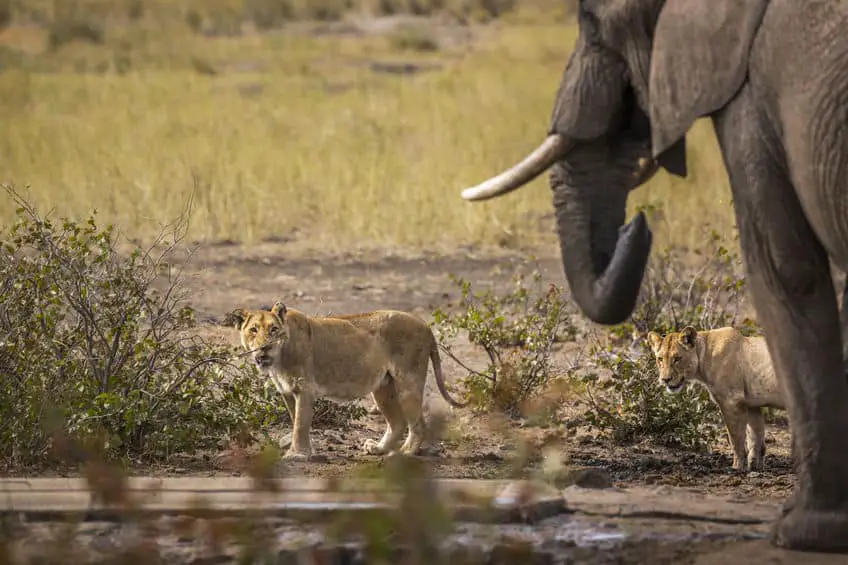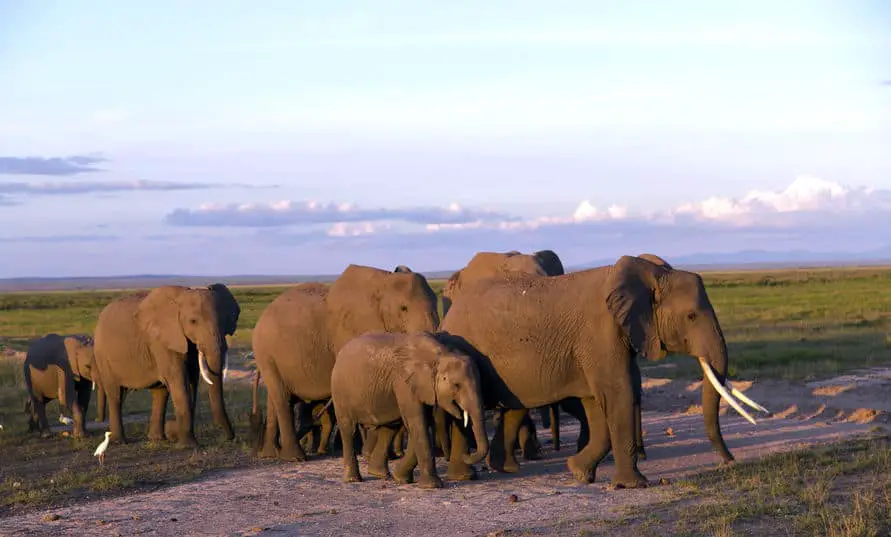
African elephants are the largest land-living animals in the world so it is natural to think that they have no natural enemies and many sources, especially online, claim so too but the truth is that elephants have several natural enemies.
Lions and humans are the primary natural enemies of African elephants but hyenas, African wild dogs, and crocodiles can also pose a threat to elephant calves. Fully grown male elephants are generally too large but females and especially younger elephants are at risk of being killed by predators.
In this post, I have covered exactly how these animals can pose such a big threat to African elephants.
What Are The Primary Natural Enemies Of Elephants?
Fully grown male elephants generally do not have any natural enemies other than humans due to their massive size and strength.
Female elephants, young elephants, calves, and very old, or otherwise weak elephants are at risk of being hunted by several predators but their most dangerous natural enemies are lions and humans.
Especially male lions pose a threat to elephants since they are much larger than female lions. The largest male lions can weigh well over 500 pounds (227 kg) and when they hunt together, they are capable of taking down very large mammals.
Female lions can, however, definitely also pose a threat to elephants since they also usually hunt together and therefore have the ability to overpower very large animals.
When lions hunt together, they can hunt and kill animals that are upwards of 10 times larger than themselves including elephant calves, young males, and even fully grown female elephants.
On rare occasions, a very large and strong male lion can take down a young and small elephant calf on its own.
Lions do actually not hunt elephants very often since elephants usually are extremely dangerous for them to hunt due to their massive size and strength and their thick skin which is hard to penetrate even with the sharp claws and teeth, lions have.
When a pride of lions is hunting elephants, they will try to separate one of them from the rest of their herd, or otherwise find an isolated elephant as it is much too dangerous to just attack an entire herd of elephants.
Lions will almost always go after young, very old, or otherwise weak elephants when they hunt as they are not able to defend themselves and cause as much trouble and potential damage to the lions as a stronger elephant would be able to.
When lions attack elephants, they will almost always attack the elephant from the back or the sides or by jumping onto its back. Lions will almost always avoid attacking elephants from the front to avoid their trunks and their deadly tusks.
While lions can definitely pose a threat to elephants, the most dangerous natural enemy for elephants by far is humans.
Poachers often seek out and kill elephants to take their tusks and according to WWF, tens of thousands of elephants are killed by poachers every year.
Another enormous threat towards elephants is the loss of habitat caused by humans in the form of city expansion, agriculture projects, or other man-made construction.
Lions and humans are not the only natural enemies for elephants.
What Other Animals Can Kill Elephants?

A big reason why lions can hunt and kill elephants is the fact that they hunt together in groups but even then, hunting elephants is an extremely dangerous thing to do for lions.
Even though it is very dangerous for lions to hunt elephants, some predators that are significantly smaller than lions may actually also try their luck on rare occasions.
Specifically, hyenas and African wild dogs can on rare occasions try their luck and attempt to kill an elephant if they have been able to successfully separate a calf or a very weak elephant from its herd. Large crocodiles may also try to snap a young calf if the opportunity strikes.
A great advantage hyenas and African wild dogs share is that they both usually stay in large groups (called cackles and packs respectively). On their own, neither a hyena nor an African wild dog would stand a chance against even a very young and small elephant calf, but when they attack as large groups, they can sometimes overpower a calf or a weak elephant.
Both hyenas and African wild dogs will only attack elephants on very rare occasions since it is an extremely dangerous thing to do. They normally both hunt much smaller animals such as wildebeests and other antelopes but in desperate times, they can try their luck on a young elephant calf.
Elephants often spend a lot of time by waterholes or rivers, either standing on the shore or sometimes in the water. This opens up the risk of being attacked by another type of predator. Crocodiles. Large crocodiles may sometimes attempt to kill a small elephant calf if they get the opportunity.
How Do Elephants Defend Themselves From Predators?
As you can see, elephants have several natural enemies and are especially at risk of being hunted by predators when they are young.
It is rare for both lions, hyenas, African wild dogs, and crocodiles to hunt elephants since their massive size and strength make it extremely dangerous, but it does happen.
One thing that makes it extremely dangerous for predators to hunt elephants is the fact that elephants are excellent at defending their weak herd members.
When under attack by a group of predators, a herd of elephants will quickly position itself in a defensive formation by forming a circle with the strong elephants on the outside, facing different directions, and the calves, old, sick, or otherwise weak elephants in the center of the circle.
When being attacked by a predator, an elephant will defend itself by using the trunk to push the enemy away and the tusks to attempt to impale them.
